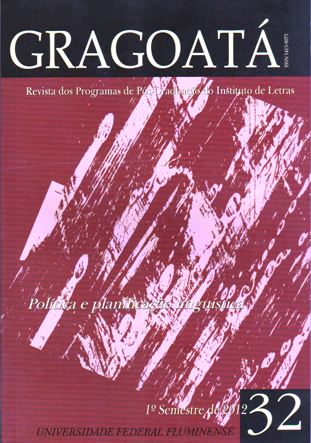Language policies and historicizing of Brazil: writing in vernacular construction
DOI:
https://doi.org/10.22409/gragoata.v17i32.33034Keywords:
language policies, Portuguese language, vernacular, writingAbstract
Traditionally the history of Brazil is told from the European point of view, more specifically, from the Portuguese perspective, and the linguistic issue plays an important role in the way ‘Brazility’ could and can be signified. The aim in this article is to demonstrate how writing establishes an arena of meanings determinant to discourses constitutive of the sense of vernacular in and of Brazil. To achieve this objective, two documents flagrant of the tension established by the linguistic policy of the Portuguese Crown were selected: a) a Royal Letter declaring war against the so called Botocudo Indians, and b) an editorial text published in Correio Braziliense about that Letter. The analysis of these documents outlines two fundamental points to the possibility of construction of the vernacular: 1) the Portuguese linguistic policy imposed a literate order and the knowledge authenticated by and through that order in detriment of an oral-driven order and the knowledge it valued; 2) writing corroborated at one time the value and the reaccentuation of the value of the Portuguese language in the cultural functioning which was instituted, constituting instrument of confirmation and questioning of linguistic ideologies. Therefore, writing in Brazil mobilised discursive fields regulator of the relation between language and society decisive for the historicisation of the country.
Downloads
Downloads
Published
How to Cite
Issue
Section
License
Authors who publish in Gragoatá agree to the following terms:
The authors retain the rights and give the journal the right to the first publication, simultaneously subject to a Creative Commons license CC-BY-NC 4.0, which allows sharing by third parties with due mention to the author and the first publication by Gragoatá.
Authors may enter into additional and separate contractual arrangements for the non-exclusive distribution of the published version of the work (for example, posting it in an institutional repository or publishing it in a book), with recognition of its initial publication in Gragoatá.

Gragoatá is licensed under a Creative Commons - Attribution-NonCommercial 4.0 International.











